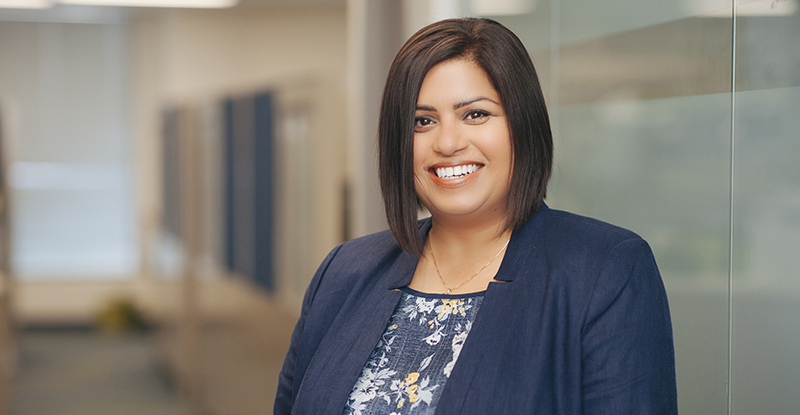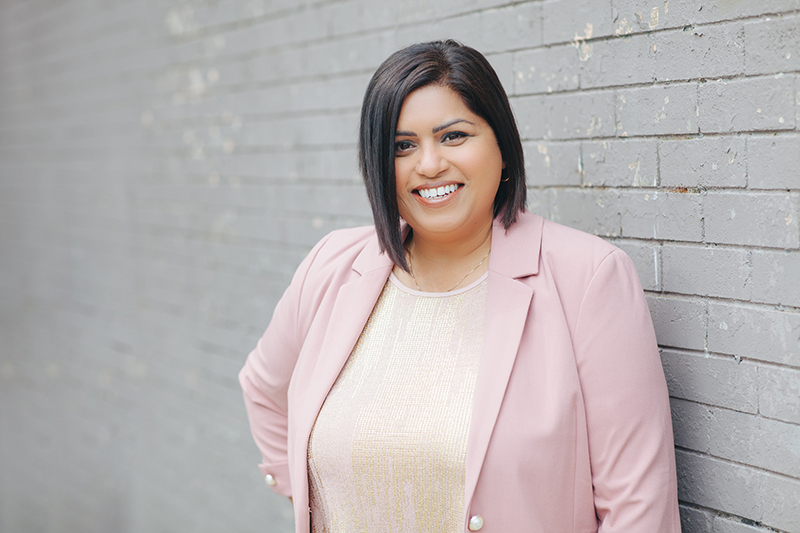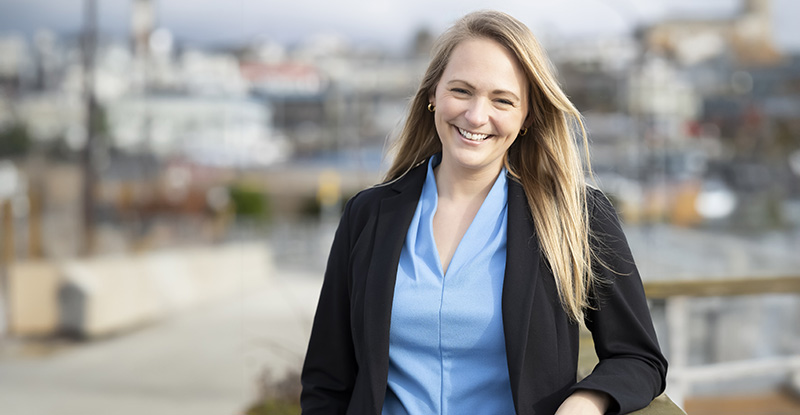
"If there is a no seat for you, if there is no place for you – you make your seat, you make your place. You say what you know to be true for you. You share what you can see, what others may not be able to see." - Livleen Veslemes
In our podcast episode, Livleen Veslemes, CPA, CMA, and winner of a BCBusiness Women in Business Award speaks to CPABC communications specialist Vince Kanasoot about her career journey and leasons learned. Part of our Coffee Chats with CPABC podcast series.
This article is part of our CPA Disruptors series
“I think that if I'm not scared, then I'm not growing. And if I'm not growing, then I'm not really living fully,” says Livleen Veslemes, CPA, CMA. When it comes to scaring herself, Livleen has plenty of experience, as her passion for growth has helped catapult numerous organizations to major success.
Livleen recently took on the role of president at Blue Heron Creamery and Lumi Foods, and previously served as CEO for bioLytical, a world leader in the development and manufacturing of rapid point-of-care tests for HIV. She helped scale the organization from a startup to operating in over 60 countries; in 2020, Livleen’s visionary leadership at bioLytical was recognized with a BCBusiness Women in Business Award in the Change Maker category.
However, it was also at bioLytical that Livleen experienced a personal tragedy that forced her to re-evaluate her career and personal trajectory, resulting in major change – this time for herself. A passionate leader, mentor, and entrepreneur, Livleen recently spoke with CPABC, reflecting on some significant moments in her career that helped her grow professionally and personally. She also discusses how she dealt with the personal struggles she faced, and offers advice to the next generation of change makers.
At bioLytical you scaled the company from 50 to 110 employees and achieved four times revenue growth. What were a couple of the biggest challenges you experienced in making the company's vision come to life, and how did you overcome these challenges?
When you have an organization of about 50 people or less, it's not hard for one leader to motivate and inspire the team. But once you've grown an organization beyond 50 people, those people have to work for something much greater than themselves or their team.
While this was a challenge I faced at bioLytical, it also demonstrated the beauty of scaling a company in hyper-growth mode. I helped bioLytical solidify its purpose and then motivate the entire team around that purpose. When people are motivated around a purpose, no one wants to drop the ball. The team aligns with the reasons why they are there day in and day out.
We faced many other challenges such as working in multiple time zones and languages, and sometimes our processes hadn’t yet kept up with our growth. But having a clear organizational purpose to wake up and go to bed to – knowing we really made a difference in people’s lives each day – was integral to how we solved our challenges.

Photo credit: Bobo Zhao Photography
COVID-19 was a very scary time for most organizations. How did you use your entrepreneurial leadership experience to lift the company up and help it survive?
Before the world shut down in early March, I knew something didn’t feel right and before the official order was given here in BC, I made the call that any of our employees who didn’t need to be in the office, lab, or manufacturing floor, should start working from home.
That was step number one: protect our employees. Constant communication was step two. Things were evolving hour-by-hour, so you might be communicating something in the morning, and by the end of the day, things would be different.
As an executive, I had responsibilities to my team, company, and shareholders, and one of those was cash preservation, knowing that the uncertainty of the pandemic could span indefinitely. This was a significant concern, because before the pandemic we were selling tens of thousands of rapid HIV tests every day, and when COVID-19 hit our sales dropped to zero, nearly overnight.
So, on March 31, 2020, for the purpose of cash preservation, the majority of our staff was laid off — but only temporarily. In the summer, almost everyone was brought back and we hired for even more positions.
As devastating as COVID-19 was, the situation was twofold. Winston Churchill once said, "Never let a good crisis go to waste." And true to those words, we found the opportunity within the crisis. We thought, since our sales were down, what else could we do during this time? That's when we decided to accelerate our strategic initiatives. We took a core group of people and fast-tracked initiatives we had planned to complete by the end of the year.
We had just come off six years of being in hyper-growth mode, and we now had the time to work on projects like implementing an enterprise resource planning system, moving into a larger facility, and commissioning new lab equipment. Usually these types of initiatives would move slower, because we would be running them in parallel to our normal workload. But during the pandemic, we were able to dedicate a team to these projects while the rest of the business was languishing.
After helping get bioLytical back on its feet during COVID-19, you went on a sabbatical. What prompted this sabbatical and how has it helped you move forward in your life?
I'm the type of leader that's always been very forthcoming with my team, and very open to talking about the challenges that women and families face.
My son turned four last year, and for three consecutive years since he was born I experienced a miscarriage, with my last one being on Mother’s Day of 2020. After that, I spoke to the chairman of our board at bioLytical and told them something had to change in my life.
When my son was born, I only took nine weeks off work, and it had been a crazy ride since then. After my last pregnancy loss, I knew I had to take time just to focus on me. I had helped scale bioLytical up and then recover during the pandemic, so I knew I was leaving it in a good place. Through Zoom, I shared very openly with my team why I was leaving and what I needed to do for myself. If I hadn't taken that time, I likely would still be in limbo personally.
The reason why I’m sharing this story is that I believe it’s important to talk about these things. If we don't talk about anything other than just work, we're never going to move ahead and make progress in leadership, whether that be men in leadership, women in leadership, or having diverse teams.
You’ve spoken about how you've been inspired by Oprah Winfrey and Indra Nooyi, former CEO and chairperson of PepsiCo, because both women made a place for themselves, which required them to go against past societal conventions. What is your advice to young people on finding their own seat at the table?
Sometimes when we are in our early 20s, we think that we shouldn't be voicing our thoughts or opinions, because we think that space is for those with decades' more experience than us. But knowledge is knowledge and I believe that no matter who you are, how old you are, what gender you are, what background you come from, if you've got something to say, you say it.
If there is no seat for you, if there is no place for you – you make your seat, you make your place. You say what you know to be true for you. You share what you can see, what others may not be able to see.
You work hard, of course. Never not have your work ethic, but keep your eyes and ears open and be the first to raise your hand to volunteer to take on a project. Or be the first to say, "Yeah, you know what? This initiative would be great," or "I have this idea." That’s what I’ve taken away from the mentors who’ve inspired me. And during the past 20 years, if I've been able to impact even one person in a tiny way, as some of these leaders have impacted me, then I will consider my job done in that way.
"I know that a lot of bad has happened during COVID-19, but there's still so much good in the world."
As someone who has made change happen, what is your advice to a young person who has big dreams but isn't quite sure if achieving them is possible, not just because of the logistics, but also because there haven't been many, if any, people like them that have done it?
They say that it's hard to be something when you can't see yourself in that role, because you haven't seen anyone else that looks like you in that role. And what I say to those individuals is that it's okay for you to be the first.
Also, while you may think that you're the first, I bet there is someone out there that has gone through that same or a similar scenario. For example, there was a young woman whom I worked with at bioLytical for the entire six years I was there. She was in her early 20s and was very motivated, full of life, and curious. She never hesitated to knock on my door to say, "Livleen, what do you think about this?" Or "Livleen, I was thinking about this."
That young woman progressed from the coordinator level up to management because of her hard work and because she continued to show up each day wanting to do more, while having a positive attitude. And as much as I offered her mentorship over those six years, I can say that she offered me a whole other kind of mentorship in another way. I could see myself in her.
The reason I’m sharing this story is because I want to encourage young people to never hesitate in forming these types of relationships and taking initiative. Share what interests you, where you want to go in your career, and what things you would like to try, because people above you will take notice and offer you those types of opportunities.
I urge young people to stay open to possibilities. I know that a lot of bad has happened during COVID-19, but there's still so much good in the world. You may have missed your graduation, your commencement, co-op work terms, as well as personal things like dating and traveling. But everything will still be there, just in different ways. So just keep at it. You are the next generation. You are our future. We need you and are here to support you.

Photo credit: Bobo Zhao Photography
What is your advice to leaders who want to foster positive change and inclusive work cultures?
I encourage other leaders out there to lead with their hearts and be open about all the things that can happen to you in your life. No one asked me to share about my personal life, but it's so important to do so.
Sharing my pregnancy losses very openly over those three years opened the conversation for all these amazing younger people I was working with who may have been experiencing their own traumatic events in their 20s and 30s, while I was experiencing them in my 40s.
If we're not open to this, we'll never create a culture of inclusivity. A culture where it's okay to bring my entire self to work and have my manager understand who I am and what I need for myself.
And if I can fill my own cup, then I can help keep the cup of work full as well. So I really urge the well-seasoned leaders to keep sharing and connecting. And I encourage the young talent coming up the ranks to not only seek out that type of leadership, but more importantly, to be that leader yourself.
Vince Kanasoot is a communications specialist with CPABC.



